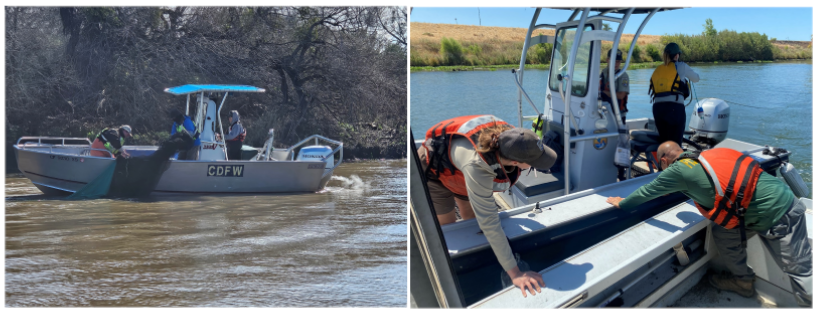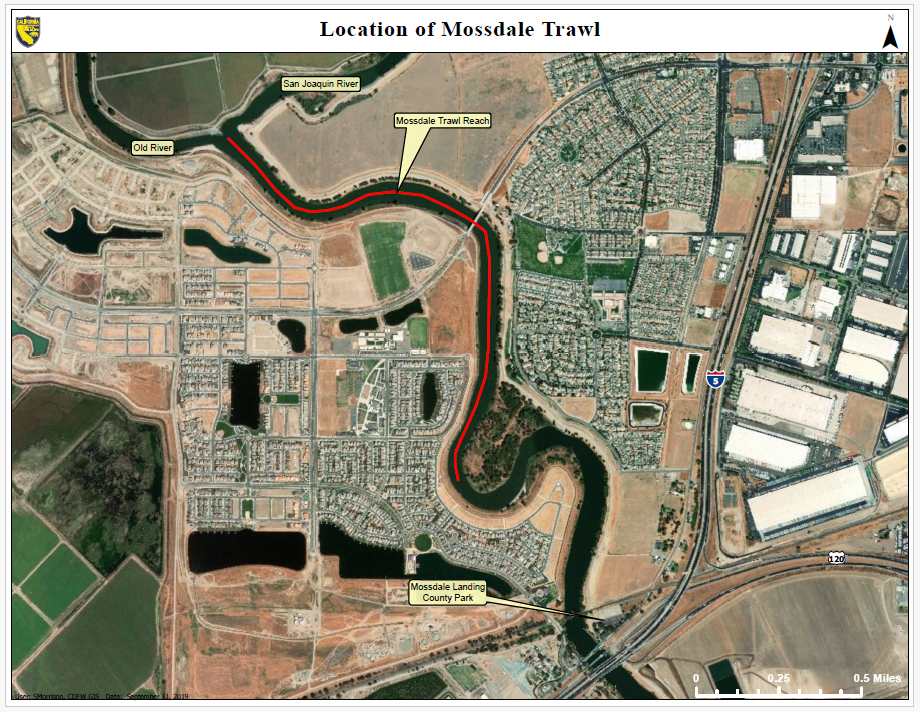Program Overview
Begun in 1987, Mossdale Kodiak Trawl is part of a larger effort to provide information on the vulnerability of Chinook salmon and steelhead to water project operations. In particular, managed releases from reservoirs on the Merced, Tuolumne and Stanislaus Rivers often result in altered flows downstream on the San Joaquin River mainstem and the southern Sacramento-San Joaquin Delta. These flows can affect out-migrating Chinook salmon and steelhead. The Mossdale Spring Trawl is conducted two miles downstream of Mossdale Landing County Park (river mile 56), and upstream of the Old River confluence near Lathrop, CA. USFWS and CDFW have been coordinating sampling at the Mossdale Trawl site since 2000 when year-round sampling was implemented.
The long-term monitoring effort is intended to track the abundance and distribution of Chinook salmon, steelhead trout, and other resident fish species. Typically, USFWS samples July – March, and CDFW samples April – June. In 2022, a collaborative effort was initiated to incorporate protocols and equipment used by each agency. This involved an integrated sampling plan using a mix of crews and gear from each agency throughout the year to assess consistency and ensure data comparability.
 Left image: USFWS and CDFW staff retrieving Kodiak trawl net and live box. Right image: USFWS and CDFW staff exchange tow rope at the end of the trawl. CDFW photos.
Left image: USFWS and CDFW staff retrieving Kodiak trawl net and live box. Right image: USFWS and CDFW staff exchange tow rope at the end of the trawl. CDFW photos.
Methods
The Mossdale Trawl runs January through December, sampling 3-7 days per week depending on the time of year. Kodiak trawls, also known as pair trawls, are conducted using two vessels to open the net . The net measures 20 meter (m) long with a mouth opening that is 7.6 m wide and 1.83 m deep. The net is composed of five panels of decreasing mesh size, ranging from 5 centimeter (cm) at the mouth to 0.6 cm at the cod end. The cod end is modified with a live box, to safely hold fish, which is checked after each tow. On each sample day, 10 tows are conducted for 20 minutes each. All fish and shrimp collected in the tow are identified and enumerated, checked for marks, and 30-50 individuals of each species of fish are measured. A subset of Chinook catch is retained for otolith and genetic studies.
 Map of the Mossdale Trawl.(click to enlarge in new window)
Map of the Mossdale Trawl.(click to enlarge in new window)
Relevant Reports & Related Information